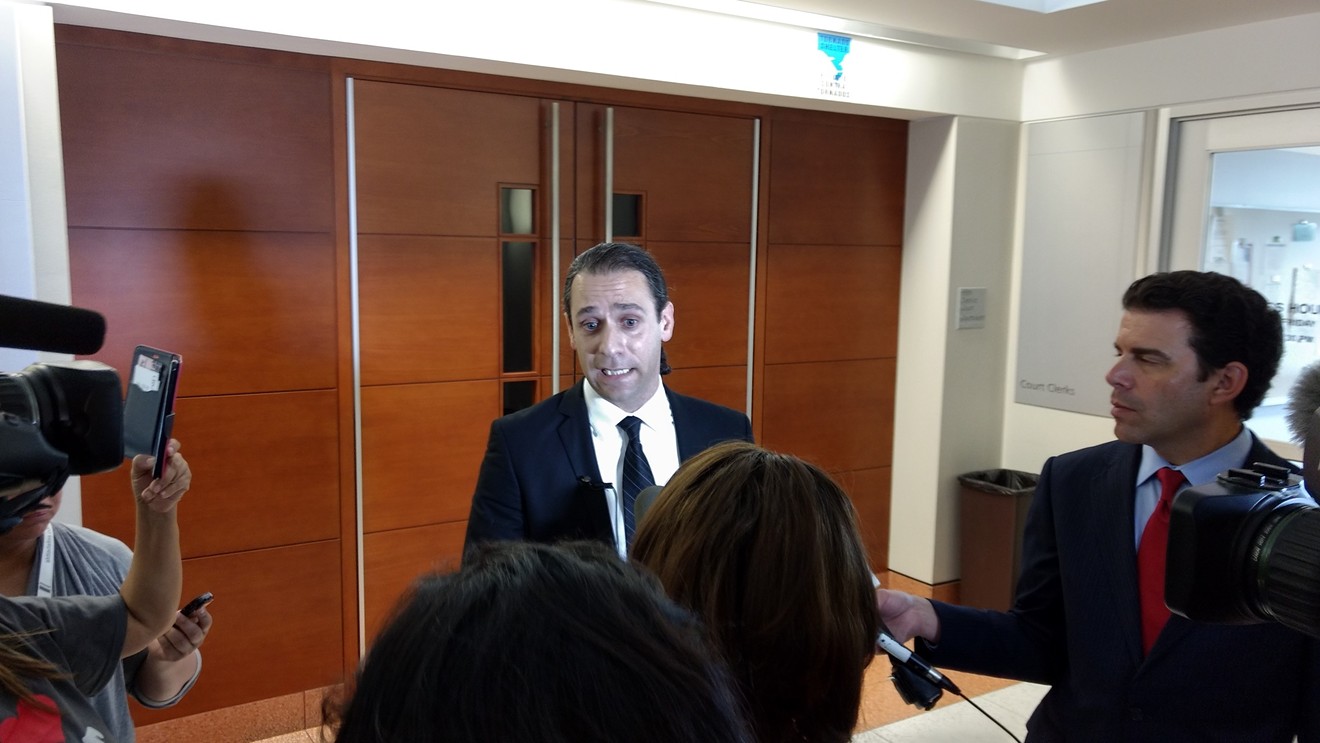Last Friday, stressed out West Dallas tenants mingled gloomily in a courthouse corridor after yet another inconclusive court hearing on their fate, now one week closer to the abyss. I heard an experienced reporter asking someone if it’s even conceivable that all of this will end with mass evictions.
John Carney, a business associate of Khraish Khraish, the main landlord in question, went into a long explanation of a state statute that Carney says gives him and Khraish no choice but to evict the remaining 130 or so tenant families in Khraish’s small rental houses in West Dallas. It is in fact the missing piece, the part maybe even City Hall doesn’t quite get yet.
The reporter waited patiently for the end of Carney’s lecture. Then he said, “So in theory some day in the near future, if nothing happens a whole bunch of constables are going to sweep into West Dallas and pour everybody out of their houses. That’s going to be unbelievable.”
Carney stared.
Down the hall, Victor Moreno, a picture-framer, stood comforting his wife. They have been tenants of HMK Ltd., a company that rents hundreds of small houses in West and South Dallas, for 20 years. They pay $370 a month and say that HMK, owned by Khraish and his father, has been a good landlord.
"You don’t know if you are going to be still living in your house. It makes a stress on everybody. You cannot plan the future.”
tweet this
“But we don’t have any place to go,” Moreno said. “It’s a lot of stress, because you don’t know in one month where you are going to be. You don’t know if you are going to be still living in your house. It makes a stress on everybody. You cannot plan the future.”
The Morenos' plight is typical of the tenants facing eviction June 3. They are 130 or so of 300 families originally threatened with displacement, the others having vacated their premises and found replacement housing somewhere. Those who remain tend to be the poorest with the least resources. Hilda Duarte, a member of LULAC Council 4782, estimates that the families still living in the threatened properties comprise between 400 and 500 individuals.
That’s who the constables will be pouring out of the homes June 3 if nothing happens to stop it – men, women, children, pets, belongings, all on the curb with nowhere to go. Then it will be believable.
The missing piece of the law – the part that City Hall either does not get yet or wants to wish away – is called Chapter 92.055 of the Texas Property Code. If the ongoing saga in West Dallas is any indication, Chapter 92.055 is soon to become very well known in Dallas, where over 55 percent of people live in rented property.
It works like this. In recent years Texas has labored to come out of the cave-man era when tenant rights are concerned. Tougher state laws and new local ordinances like the one Dallas passed last year are designed to protect tenants from getting booted as vengeance for reporting building code violations to city and state inspectors.
But there’s a backdoor. That’s 92.055. A landlord is allowed to look at his property, count up the cost of needed repairs and figure the max he can get in rent with the property in compliant condition. If he thinks there is no way he can meet the code and still make money on the property, he can opt to simply take the building off the rental market. It’s a way of crying uncle.
But the law is no fool. It’s written to make sure the landlord isn’t just faking taking it off the market to get out of making the repairs. Called, “Closing the Rental Premises,” Chapter 92.055 says, “A landlord may close a rental unit at any time by giving written notice by certified mail.” But (and it’s a big but), “after the tenant moves out the landlord will either immediately demolish the rental unit or no longer use the unit for residential purposes.”
You want out? OK. Knock it down. That’s the law.
HMK Ltd. was specifically targeted by Dallas Mayor Mike Rawlings as a slumlord, even though HMK properties complied with previous code requirements before last year’s tightening. Rawlings has vowed to bring the full weight of the city’s new rental ordinance to bear.
Under the new law, criminal penalties alone can amount to $2,000 a day per property. Civil penalties can add another $1,000 a day. So for HMK’s original 300-plus targeted rental houses, that was a theoretical fine of almost a million dollars a day, not to mention a possible criminal record.
HMK took a look at it, added up the risk, thought about ways they could redevelop their land with less legal exposure and decided to go out the backdoor. But the city didn’t seem to know there was a backdoor.
Last year when Khraish announced that HMK was taking the 300-plus properties off the market, the mayor, with lawsuit-waving city attorneys in tow, accused Khraish of all kinds of perfidy and vengefulness, as if he was cutting off his nose to spite the mayor’s face.
HMK’s property seems like a pretty big investment to toss in the ditch for spite. Not a week ago Khraish laughed at a $17 million offer for the properties. But let’s say it is spite. The reality remains that Khraish has launched a process under the law that provides a specific mechanism by which he can get out of the rental business and not face fines.
This all happened last year. The law provides that a landlord must either demolish his property immediately or bring it up to code within six months. During that time, he is effectively sheltered from code enforcement because his property is either unoccupied or nonexistent.
When the city took HMK to court last year, it persuaded Dallas County 95th District Judge Ken Molberg to restrain HMK from kicking out any rent-paying tenants. HMK agreed to the order, on the grounds that the court recognized it was trying to get out of the rental business and should be sheltered from code enforcement by state law.
In other words, they said basically, and I do paraphrase: We have a right under state law to get out of this business. We want to. We’re following all the steps. We ought to be free from code enforcement at this point. You can’t order us at gunpoint to keep renting our property and then start hammering us with code violations, kind of like pinning us down and then beating us up.
So at Friday’s hearing, that’s exactly what Assistant Dallas City Attorney Melissa Miles said she wanted to do. HMK was in court saying they would agree to an extension of the judge’s order for as long as a year so they could develop replacement housing, but only if they continue to be free from code enforcement.“This is not a racist issue. This is a classist issue. This is about targeting low-income families for the sake of developing Dallas."
tweet this
Miles said the city would only consider an extension if HMK opens up its properties to inspectors again. And here’s the thing: Both Carney and HMK’s lawyer, Charles McGarry, explained to me after the hearing that they believe HMK is protected by law from ruinous fines and criminal penalties only as long as it obeys the law – Chapter 92.055 – to the letter.
They say if they muddy it up – oh, we’re getting out of the rental business, but we’re still sort of in it, and we’re protected from code enforcement, but, yes, sure, you can go ahead and enforce the code on us – then all of a sudden they’re in no man’s land.
They don’t want to be in no man’s land. They want to be in Chapter 92.055. But the only way they can do that, they say, is to immediately demolish the remaining 130 houses the day the protection of the court order goes away.
I also heard Kraish making an important point to a whole scrum of reporters in the hall after the hearing: “The city is destroying me to remove me from the neighborhood to continue gentrifying West Dallas," he said. "Their intention is to remove all low-income African-American and Hispanic tenants from West Dallas so they can continue building high-end apartments.
“This is not a racist issue,” he said. “This is a classist issue. This is about targeting low-income families for the sake of developing Dallas.
“The truth is, if you go down to West Dallas, there is plenty of room for everybody, high income, middle income, low income. It’s very sad that the city of Dallas chooses to push low income families out of West Dallas for the sake of developers.”
As it stood at the end of Friday’s hearing, HMK will agree to an extension of the court order keeping the tenants in their houses for a year, but only if the city agrees that HMK has not forfeited its protection from code enforcement during that time.
The city said at the hearing it will only agree to the extension if it can enforce the code. Judge Molberg told the two sides to work it out by next Friday. At that point the mass evictions will be three weeks away.













